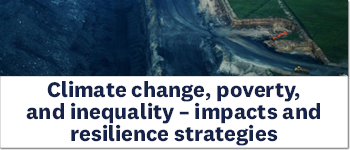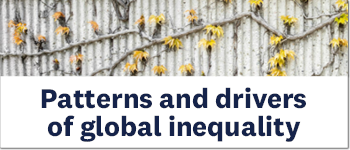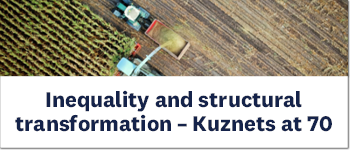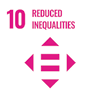Income inequality has escalated within nations over the last decade, challenging global efforts to improve inclusiveness and achieve the United Nations’ 2030 Agenda for Sustainable Development. Despite modest progress globally in reducing inequality, some forms of inequality endure, requiring new thinking and more systematic policy efforts to address them.
UNU-WIDER’s Reducing persistent inequalities across and within countries research area advances understanding of the trends and drivers of inequalities, both globally and within countries. It analyses which policies and public actions are more and less successful at creating greater equality and questions how and why efforts to reduce inequality have not always been sufficient to reduce enduring inequalities, especially in the Global South.
Reducing persistent inequalities across and within countries supports human and economic development and well-functioning stable states and societies. It reduces the risk of conflict, increases stability and economic growth, and supports poverty reduction. In this research area, UNU-WIDER continues its long history of policy-relevant research related to the key question, what works to reduce inequalities?
Key questions
- What are the key drivers of income inequality between countries and which factors are critical to the continued convergence of global income levels?
- Which factors determine the levels and trends of inequalities within countries and which policies support long-term reductions of these inequalities?
- Which public actions are needed to prevent or negate the root causes of inequalities at every stage of life, from provision of pre-natal care onwards?
- How will global and national efforts to achieve the net zero transition by 2050 affect inequality?
In the 2024-27 work programme, our work on reducing persistent inequalities across and within countries includes the following projects:
Contributions to the cross-cutting themes of the 2024-2027 work programme
To fight the impact of climate change, governments have started to put in place mitigation and adaptation policies. While these policies are important, there is scope to analyze how these policy interventions impact poverty and inequalities. This research area will also integrate climate considerations into its analysis of patterns of global inequality.
Gender remains an important dimension of enduring inequality. Gender barriers, intersecting with other forms of disadvantage such as race, ethnicity and class, continue to pose significant challenges in low- and middle-income countries. This research area will focus on gender responsive policy approaches with the aim of reducing inequalities and barriers faced by women.
We will deepen and extend our contributions to the ‘data revolution for sustainable development’, by continuing to expand the scope and usability of our flagship World Income Inequality Database - WIID.
The United Nations’ 2030 Agenda for Sustainable Development
This research area aligns with UN Sustainable Development Goal 10 of reducing inequality within and among countries. We contribute to the achievement of this goal b providing evidence on the factors driving inequality and policy interventions supporting the overturn of inequality trends.

 Join the network
Join the network





















